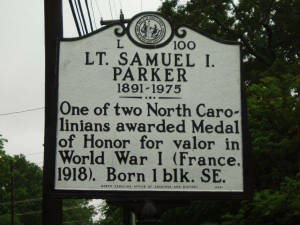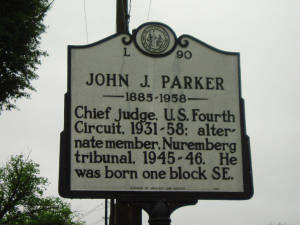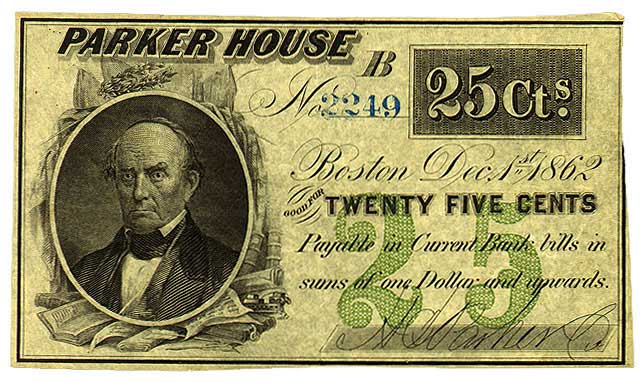FAMOUS INFAMOUS NOTORIOUS PARKERS HISTORY Captain John Parker Hanging Judge Parker Bonnie Parker
Quanah Parker General Ely Parker Richard Parker John F Parker Eliza Parker LeRoy Parker Samuel Parker
General Ely S. Parker: Military secretary to Union General Ulysses S. Grant
In an interesting twist of history, General Ely S. Parker, a member of the
Seneca Tribe, wrote the "articles of surrender" which General Robert
E. Lee signed at Appomattox Court House on April 9, 1865. General Parker, who served as Gen. Ulysses S. Grant's military secretary
and was an attorney, was once rejected for Union military service because of his race. At Appomattox, General Lee supposedly
remarked to Parker," I am glad to see one real American here," to which Parker replied, "We are all Americans."
Quanah Parker: Last Chief of the Comanches
Chief Parker never lost a battle to the white man. His tribe roamed
over the area where Pampas stands. He was never captured by the Army, but decided to surrender and lead his tribe into the
white man's culture, only when he saw that there was no alternative. The City of Quanah, Texas, is named in honor of Chief
Parker.
Lt. Samuel L. Parker: Medal of Honor Recipient

John F. Parker: The Guard Who Abandoned His Post
One of many unsolved mysteries regarding Abraham Lincoln's assassination
is the story of John F. Parker. Parker, a member of Washington's Metropolitan Police Force, was assigned as President Abraham Lincoln's bodyguard the night of the shooting. However, Parker's chair outside the State Box at Ford's Theatre was vacant most of the evening.
Nowadays, leaving the President unguarded is unconscionable, but in 1865 Parker was never punished for neglect of duty. In
fact, for a time, he remained a White House guard. He kept his position as a Washington police officer until 1868 when he
was fired for a totally unrelated reason.
Captain John Parker: “Shot heard ‘round the world”
"Stand your ground! Don't fire unless fired upon, but if they mean to have
a war, let it begin here!" Captain John Parker to the company assembled on Lexington Green.
Eliza Parker: Mother of Mary Todd Lincoln
Mary Todd (Lincoln) married President Abraham Lincoln. Mary is the daughter of Eliza Parker and Robert Smith Todd, pioneer settlers of Kentucky. Eliza Parker died before Mary was seven years old. Her father remarried; and Mary remembered her
childhood as "desolate" although she belonged to the aristocracy of Lexington, with high-spirited social life and a sound
private education.
Matthew Parker: Archbishop of Canterbury
He became chaplain to Henry VIII in 1538, and was recommended
to Corpus as its new Master by Henry in 1544. The original letter of recommendation in the "King's own handwriting" still
lies in the Parker Library at Corpus. Having praised Parker's virtues, the King's recommendation was something few people
would dissent and Parker was duly made "Head of House." Both Corpus and the University were in great need of a capable
administrative and politically sensitive talent at this time, skills Parker had in abundance; Henry had acted wisely.
He became Vice-Chancellor of the University in 1545 and again in 1549, but then under Queen Mary retired from public life
to Norfolk and was deprived of his livings, retreating for some time to Frankfurt, Germany.
Richard Parker: Pronounced the death of John Brown
On October 16, 1859, John Brown led 21 men on an assault at Harpers Ferry
-- an event that shook the nation and nudged it even closer toward the American Civil War. Among these raiders were five black men: two of these men would die at
Harpers Ferry, two would be captured and executed, and one would escape to Canada.
Judge Richard Parker
pronounced the death of John Brown, who was captured at Harpers Ferry, Jefferson County, Va. (In 1863 it became part
of West Virginia). Richard Parker (December 22, 1810– November 10, 1893) was an American lawyer, jurist, and politician
from Winchester, Virginia. He represented Virginia in the U.S. House from 1849 to 1851. While serving as a Virginia circuit
judge in 1859, he presided at the trial of John Brown, the abolitionist, and sentenced him to death for the raid on Harpers
Ferry.
Judge Isaac C. Parker: "Hanging Judge Parker"
"I am the most misunderstood and misrepresented of men. Misrepresented because misunderstood."
-Judge Isaac C. Parker, 1896
For 21 years, between
1875 and 1896, Judge Parker presided over 13,000 cases, including 79
men that died on the gallows. The original gallows were demolished by the city of Fort
Smith (Arkansas) in
1897; today, a reconstruction of the 1886 gallows is located on the original site.
United States Chief Judge John J. Parker: Alternate Member for
Nuremberg Tribunal

Sarah Parker: Chief Justice of the North Carolina Supreme Court
Chief Justice N.C. Supreme Court, February 1, 2006, to present; Associate
Justice N.C. Supreme Court, 1993-January 31, 2006, (re-elected, November 5, 1996 and November 2, 2004); Judge N.C. Court of
Appeals, 1985-1993 (appointed, December 28, 1984; elected, November 4, 1986; re-elected, November 6, 1990); Attorney in Private
Practice, 1969-1984; Volunteer, U.S. Peace Corps, Ankara, Turkey, 1964-1966.
LeRoy Parker, AKA Butch Cassidy:
Outlaw
Butch Cassidy was born Robert LeRoy Parker and was a notorious train and bank robber. Parker
was born in Beaver, Utah on April 13, 1866, and was the first of 13 children. His Mormon parents had come
to Utah from England in 1856. His parents moved over the mountains to Circleville in 1879 and young Roy, as he was known about
the house, worked in ranches across western Utah, including at Hay Springs, near Milford. Butch Cassidy, AKA Robert LeRoy Parker
When Bonnie Parker and Clyde Champion Barrow were killed in 1934, they were believed to have committed 13 murders and several
robberies and burglaries.
Private Issue Bank Note, Parker House, Massachusetts,
25 cents, 1862

|

